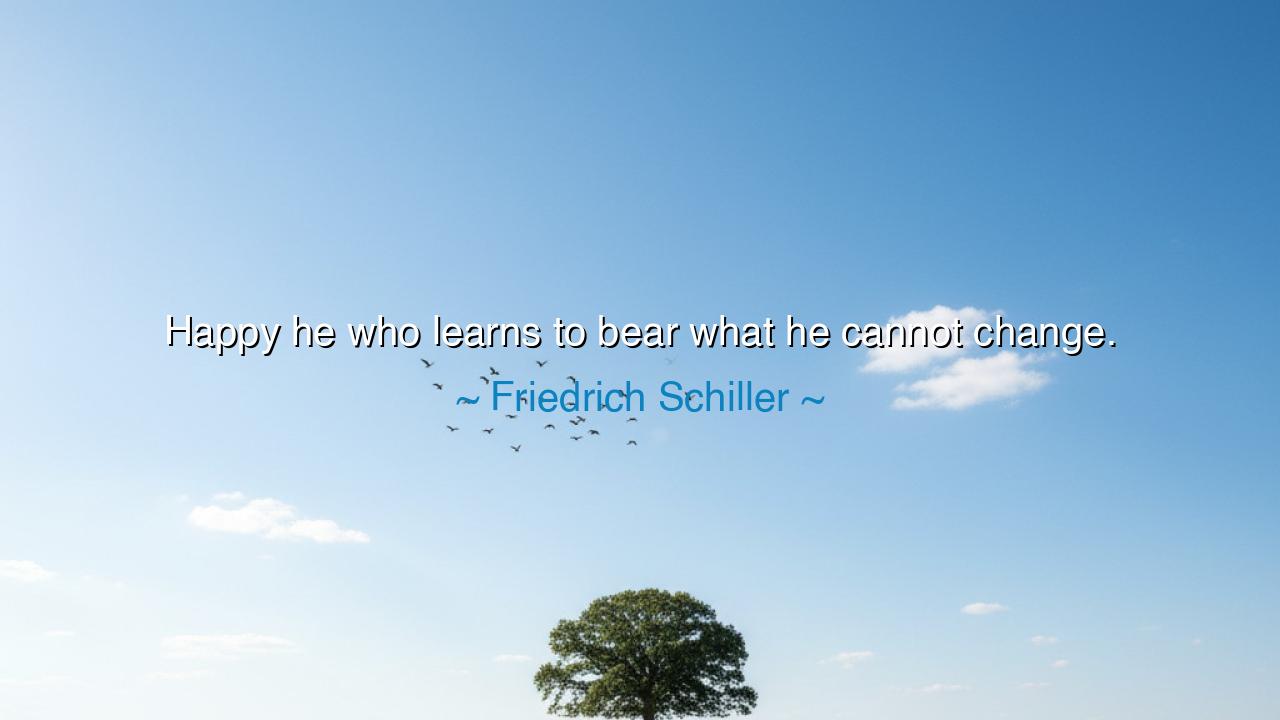
Happy he who learns to bear what he cannot change.






Host: The room was quiet, the faint rustle of leaves outside the window the only sound breaking the stillness. The evening had settled into a soft, peaceful rhythm, the kind that only comes after a day well-lived. Jack sat by the window, his thoughts far away as he watched the shadows grow longer. Jeeny, across from him, sat with her legs tucked beneath her, her hands absentmindedly sketching in her notebook, though her gaze was fixed elsewhere. The air between them felt calm, but there was something unspoken that lingered, a quiet question hanging in the space.
Host: Friedrich Schiller’s words filled the silence: “Happy he who learns to bear what he cannot change.” The simplicity of the phrase, and yet its depth, was almost striking. To bear something, to accept what life presents without resistance, seemed like both a gift and a challenge. Jack, always the more skeptical of the two, was the first to speak.
Jack: His voice was slow, as if the weight of the words had already begun to settle within him: “It’s easy to say, right? ‘Learn to bear what you can’t change.’ But how do you do that? How do you just accept the things that hurt, the things that feel impossible to deal with? It's not as simple as just deciding to be happy with it.”
Jeeny: Her eyes softened, her voice filled with understanding as she looked up from her sketchbook: “I think Schiller’s not saying it’s easy. I think he’s acknowledging that sometimes there are things that happen, things we can’t control, that we just have to learn to live with. And in learning to bear them, we find a kind of peace. Not in the situation itself, but in our response to it. It’s about letting go of the need to fight against what we can’t change, and instead, finding a way to live with it.”
Host: The room felt a little heavier now, the conversation taking on a deeper tone. Jack’s usual resistance to ideas of acceptance and peace seemed to soften slightly, though the skepticism still lingered. The idea that true peace came not from changing external circumstances, but from accepting them, felt like a challenge—a challenge that, in some ways, they had both already encountered in their own lives.
Jack: His voice was quieter now, more reflective, as though he were thinking through the idea: “I guess it makes sense. We spend so much energy trying to change things, trying to fix things that we can’t, that we lose track of the peace that comes from accepting them. But it’s hard, isn’t it? The world keeps throwing things at you, and sometimes, no matter how hard you try, you can’t change any of it.”
Jeeny: She nodded slowly, her expression calm, but with a quiet strength: “Exactly. But that’s where the peace comes in—when we stop fighting against things that can’t be changed. We learn to carry them with us, without letting them define us. It’s not about being passive, it’s about being at peace with what is, while still working toward what we can change.”
Host: The quiet in the room deepened, the words sitting between them with a weight that was unsettling, but also strangely comforting. The idea that true peace wasn’t found in changing everything, but in accepting what we couldn’t, was starting to sink in. Jack shifted in his seat, his gaze drifting from the window to Jeeny, as though he were seeing the idea from a new perspective.
Jack: His voice was softer, less resistant, as he continued: “Maybe it’s about letting go of that constant need to fix everything. The things we can’t change—maybe they’re not things to fight against, but things to learn from. They shape who we are, and in accepting them, we can find a kind of freedom.”
Jeeny: Her smile was small, but full of quiet reassurance: “Exactly. It’s not about giving up. It’s about recognizing what’s beyond our control and making peace with it. In doing that, we free ourselves from the constant pressure to change the unchangeable.”
Host: There was a calm that settled in the room, a quiet understanding that came from the recognition that true peace didn’t come from always getting what we want, but from finding ways to bear what we can’t change. The outside world, still and dark, seemed distant now, irrelevant to the realization that had taken root between them. Jack and Jeeny sat together, the unspoken weight of Schiller’s words now a part of their shared understanding.
Jack: His voice was almost a whisper, but it held the weight of something deeper now: “Maybe that’s the key. Peace doesn’t come from control. It comes from learning to live with what we can’t change.”
Jeeny: She smiled softly, her voice reassuring, filled with understanding: “Exactly. In that acceptance, we find freedom—not from our circumstances, but from the need to change everything around us.”
Host: The night continued, but inside, there was a quiet peace. The conversation had opened a door to something deeper, an understanding that peace wasn’t about controlling the world around us, but about accepting it as it is and finding strength in that acceptance. Jack and Jeeny sat in the comfort of that realization, knowing that sometimes the most profound moments of growth come not from what we can change, but from what we can learn to bear.






AAdministratorAdministrator
Welcome, honored guests. Please leave a comment, we will respond soon